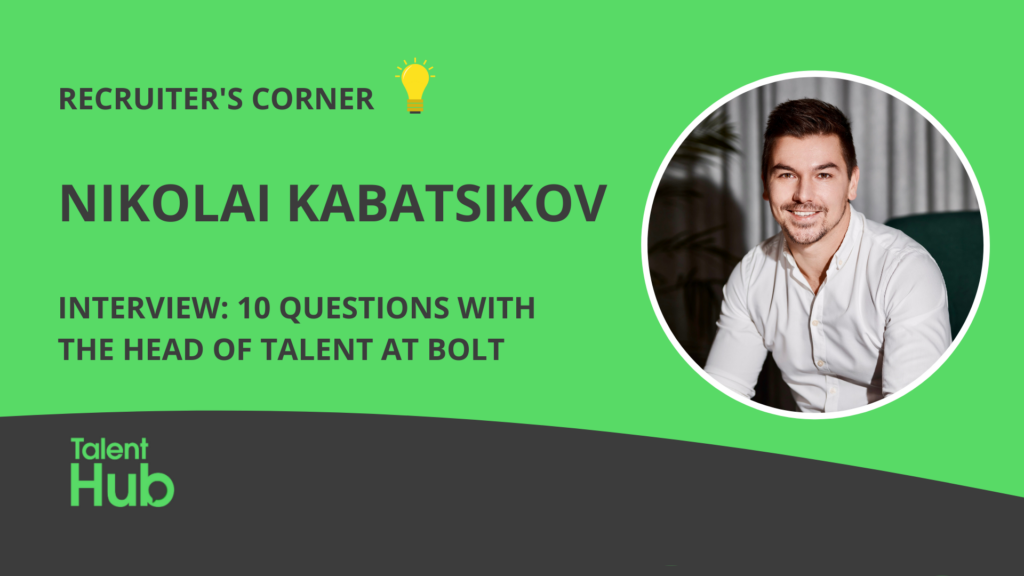Our latest guest in our Recruiter’s Corner blog series is Nikolai Kabatsikov, Head of Talent at Bolt.
Having been one of the first employees of Bolt, Nikolai has experienced all the ups and downs of the company, which was recently valued at $8.4 billion.
In this interview, we asked him about his journey into recruitment, how Bolt’s new funding round will impact their hiring strategy, what he values in recruiters, and much more!
Let’s jump right into it!
1. You graduated from Media Studies, how did you find your way into recruitment?
Like many young people, I didn’t know what I wanted to do so I chose to study something that sounded interesting. I was into creative things, such as blogging, music, and so on, but once I actually took the classes I realized it isn’t something for me. I didn’t want to go into traditional media roles, and YouTube wasn’t big at the time so I couldn’t create my own content either.
But at the time I studied in London, recruitment was trending in the city. There were a lot of entry-level openings, promising fast career progression and an opportunity to make a lot of money via commission. As a young guy, that was what motivated me.
I picked up recruitment quite fast – I was the top performer in my agency within the first year. However, it didn’t take long until I wanted to move on and prove myself at a global level. I decided to apply to some of the biggest tech companies in the world, and was fortunate enough to land a job at Google.
Eventually, however, my motivation changed and I wanted to do something more impactful and satisfying. I had learned the craft and wanted to put my skills to the test at a company which I could see scale. That’s when I decided to move back to Estonia and join Taxify (now Bolt). Looking back, it was a big risk, but it has paid off.
2. At the time you joined Bolt, the company was called Taxify and had 20 employees. You have over 3000 employees now. What has been the biggest challenge along the journey?
When we were a small start-up there was a phase when no one believed in us. Investors thought we couldn’t compete with Uber who was dominating the market. Candidates were also skeptical. We were struggling to attract quality talent and had very few CVs coming our way. We had to work hard through this period and eventually had a couple of big successes, such as expanding into the African markets.
Things changed from then onwards. After the first year, we had hired a hundred employees. It became a massive race to hire enough people to allow the company to grow and launch the business in the new markets.
While the employer brand in Estonia started to improve, the next challenge was to hire people internationally in countries where nobody has ever heard of us. The hardest task is to find the very first person in the country who will be launching the business, setting up the local office, and building the team on the ground.
3. Bolt recently announced another funding round worth €628 million. What impact has this had/will have on your hiring strategy?
Our goal is to reach 5000 employees this year, 1000 of which will be in engineering and product teams. So far, we have been hiring engineers in Poland, Romania, and Estonia.
Our main focus will be to build new tech hubs, starting from Berlin. We are planning to hire at least 100 software engineers & product talent there this year.
4. I read that on average, Bolt receives about one CV per minute. What is it about Bolt that makes so many candidates want to join you?
Impact and personal growth. People, especially the younger generation, don’t just want a high salary anymore, they also want to do something that is meaningful. At Bolt, we are making cities greener by reducing the number of cars on the road. We don’t want cities that are built for cars, we want cities that are built for people. That is very attractive to candidates.
From a personal growth standpoint, we give our employees the freedom to do their work. If you are keen to learn, we provide you with the right foundation and environment.
Also, in many companies, you can’t see the bigger impact of your work, but here, you can see the results of your work from a window. You can contribute to building apps that your friends and family are using.
Besides that, our employer brand has improved significantly since 2016. That was the time when we started to encourage our employees to share content and recommend Bolt to others. We’ve learned that word of mouth is by far the most effective way to boost your employer brand. There’s more to come though, as we have just hired our first employer branding specialists in the company.
From the outside, it may seem we are very attractive to candidates, but when you are an in-house recruiter, you realize there are never enough candidates. At this point, we might even receive two CVs per minute, but this volume doesn’t always translate over to quality.
5. What are some of the cultural values all Bolt employees share? What kind of interview questions does Bolt use to assess them?
We have our own hiring traits which we use to hire candidates. These include drive, intelligence, and integrity.
- Drive – the person’s motivation and desire to achieve big things. This is mainly assessed during interviews.
- Intelligence – the person’s analytical ability. We want to hire people who are smart and are able to tackle complex problems. They are able to take calculated risks and be systematic in their approach. This trait is usually assessed using a test task.
- Integrity – we want people who are honest, ethical, and have empathy. It’s important for us to trust each other and do what’s best for the company and the world. Similarly to drive, we assess this trait by having a conversation with the candidate.
Regardless of the role and the seniority, everyone will go through three interviews and a test task. We like to give candidates different kinds of tasks, for example, coding, excel spreadsheets or business launch plans. This tells us how they approach their research, how they use data and make conclusions.
But overall, there are no strict rules and the hiring process can be flexible. We understand people are different and in the end, it’s about finding the right fit.
6. Considering you receive so many applications every day, how many of your hires are active candidates vs passive candidates?
For technical roles, about 30% of hired people are active candidates who apply themselves. We are trying to raise that through our employer branding activities. The rest (70%) come from headhunting or referrals.
For non-technical roles, it’s 50-50. Generally, we do a lot of reachouts and are always actively looking for the best talent.
7. What’s the secret to a great candidate reachout?
There is no one-size-fits-all to a great reachout – every company will have their own best reachout message. This also depends on what stage your company is at and where your target candidates are located.
What we do is we A/B test our reachouts. For example, we send 100 reachouts with emojis and 100 without; personalized and non-personalized; with salary mention and without; with a lot of text and a short message.
We also measure the response rate, open rate and even the time the candidate spends on reading the message. There are many great tools out there to measure this, such as MixMax or GEM.
But overall, our approach involves using an informal communication style, being approachable and honest. We aim to be as detailed as possible in our reachouts. For example, for developers, we want to include info about our tech stack, as well as our product roadmap. If you don’t tell candidates the most important information about the role, they won’t continue the conversation.

8. Hiring for potential vs hiring for experience – What do you think is the right way and what do you practice at Bolt?
We don’t necessarily prioritize one over the other. We follow our hiring traits and based on that, try to find the best fit. In general, potential is more important because most things can be learned. We have many success stories in Bolt where people join us at an entry-level role and go on to become senior managers. But of course, there are some positions that require experience, such as legal roles.
9. The demand for recruiters has been sky-high for a long time. What are some of the qualities you look for in recruiters when hiring them?
I don’t think in recruitment, hard skills are that important, as these things can be taught. Instead, what we look for in recruiters is integrity, honesty, and a keen interest to learn. We don’t like people who think they know everything. We like to use and test new tools so it’s important to be open-minded enough to try new things.
It also depends on what stage your company is in. Earlier, we needed people with experience, so my priority was to hire recruiters who had done it before in a fast-paced start-up environment. Now, it has changed. We have built a core team of recruiters who onboard and train newcomers. Ideally, we want to have a balance of interns, juniors, seniors and managers.
10. Do you have any funny recruitment stories to tell?
One of the most recent ones is that there’s another Bolt in the US who recently announced that they are doing a four-day workweek. Now, we have candidates coming to us saying how fantastic it is to have a three-day weekend and that they want to work for us now.
It’s both good and bad. We attracted a lot of candidates thanks to this, but then we also have to explain to them that we are not the actual Bolt doing the four-day workweek.
11. What are your go-to sources where you learn about recruitment?
There’s a lot of free, quality content on YouTube about recruiting, how to interview, how to source, different ways to approach CVs and so on. Also, back in my agency days I watched a lot of videos by Johnny Campbell from Social Talent. On sourcing, I also recommend reading blog posts from Glen Cathey. Absolute must for tech recruiters is to go through this webinar by Hung Lee and Yaroslav Doronin: How 7 recruiters hired 200+ engineers in 1 year — a case study with Bolt.
I learn best by doing. If you don’t have the opportunity to practice recruiting or sourcing in your workplace, I recommend practicing on Sourcing.Games and participating in online sourcing hackathons.
I have people approach me on LinkedIn asking me for paid mentorship, but I don’t really understand it when there’s so much free content available on various platforms. If you are a junior recruiter, you should definitely start by self-learning on YouTube and connecting with other recruiters on LinkedIn.
Thanks for taking the time to answer. To finish, we’ve got a few rapid-fire questions for you.
What is your favorite recruitment tool?
LinkedIn, it’s irreplaceable.
What is your best sourcing hack?
Email automation. On GEM, I’d send 1000 reachouts within a click of a button. It makes my job a lot easier.
Any reading recommendations?
Glen Cathey’s blog: Boolean Black Belt
Hung Lee’s Recruiting Brainfood
High Output Management by By Andrew S. Grove


